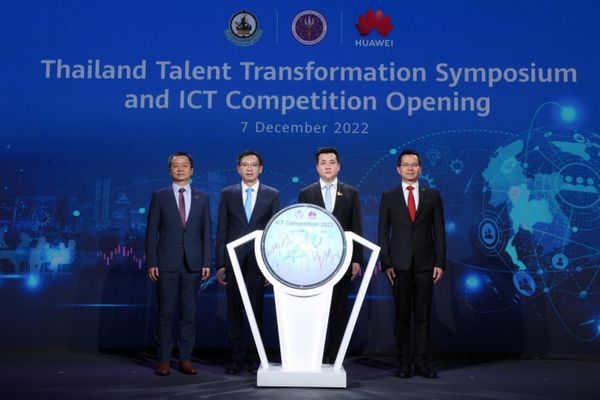
Digital infrastructure modernisation, agile operations and ecosystem partnerships are imperative for businesses to create new innovations and services and achieve success in the face of digital disruption and other pressing challenges, say IT heads of business pioneers in Thailand.
The chief information officers recently highlighted the importance of sustainability as one of the key strategic moves for large enterprises to pursue.
They shared their views at a panel discussion, entitled “Turning Ambition to Action”, as part of the 70th anniversary celebrations of IBM Thailand, the local unit of the global tech powerhouse.

Tapakorn Siritanawutichai, executive vice president for IT infrastructure at Siam Commercial Bank (SCB), explained that SCB has continuously modernised its infrastructure and applications to deliver better and faster services while improving customer experience.
“Our core banking system relies on an IBM mainframe which gives us high reliability and security,” said Mr Tapakorn. “Today, the system connects with multi clouds, open systems and micro services to increase agility and help us create new services to meet customers’ dynamic needs.”
“IBM Garage has helped us rapidly move from MPV to the adoption of Enterprise Service Bus (ESB) and IBM Cloud Pak for Integration which integrate and link applications across the legacy and hybrid-cloud environments to speed the development of our products and services.”
Mr Tapakorn added that, “SCB has focused on improving financial literacy and becoming a ‘Banking as a Service’ (BaaS) provider. To this end, we have built an end-to-end ecosystem platform, connecting with our partners and within SCB X group through API services. Data is key and the ability to gain customer insights by leveraging AI helps us provide the right services when our customers need them most.”
“Above all, we are moving toward a sustainable banking model. We take into consideration the sustainable index and how our product offerings and working partners can make a positive impact on the planet. For example, sustainability will become one of the criteria in loan consideration.”

SCALING AND EXPANSION
Mongkol Uechitanantakul, Deputy Managing Director of KASIKORN Business-Technology Group (KBTG), commented that, “Kasikornbank (KBank) has an ambitious plan to grow overseas, aiming to capture 200 million users in China, Vietnam and Indonesia as well as targeting 20 million users of K PLUS app.”
“IT infrastructure is key to supporting our expansion and the ability to integrate and share data across platforms wherever we operate,” he continued. “This will enable us to better understand the needs of our clients and offer them the right products.”
“One example is how our bank provides loan incentives to people who do good for society in China, an approach we are also considering for Thailand.”
Bank IT infrastructure is a crucial engine to support today’s consumers, particularly during their peak mobile banking usage, he said.
“We pick the right technology to match our needs and be future-ready,” Mr Mongkol continued. “Our core banking operations need high-speed transactions and vertical scaling, and we choose IBM Power Systems for this. For the horizontal scaling part, we use cloud and micro services technology.”

EMBED BANKING INTO EVERY CUSTOMER’S LIFESTYLE
“Banks today need to keep pace with people’s changing lifestyles and deliver what they need,” revealed Pochara Vanaratseath , head of information technology at Bank of Ayudhya (Krungsri).
Since 2019, Krungsri has used an open API platform that connects with services provided by its fintech and startup partners to rapidly deliver new products and services to its customers through the ecosystem.
“The Open API platform serves as a new revenue stream for the bank that offsets a decline in traditional services revenues,” said Mr Pochara.
Krungsri’s transformation journey has been driving towards digital transformation based on “people, product and process”, he added.
“Our core banking system today relies on an IBM mainframe while at the same time, as we try to become more agile, IBM is helping us transform from a waterfall model to a new, more streamlined way to work,” he added.
Going forward, Krungsri wants to embed itself into every customer lifestyle in every channel, be it at branch, online or mobile app level. “This will not only require digital transformation, but transformation of people, product and process altogether,” Mr Pochara explained.

RETAIL ENTERTAINMENT
Jirayoot Karnjanamayoon, chief information officer of The Mall Group, one of the country’s leading retail operators, highlighted the importance of digital transformation, explaining that, “The Mall Group has been on a digital transformation journey, adopting data and AI technology to push ahead with omnichannel creation, for the past five years. The aim is to create a seamless offline-online ecosystem that engages and satisfies customers in all distribution and payment channels.”
The Group has leveraged IBM’s technology to consolidate and analyse data, not only from transaction tickets but also from real-time customer traffic.
“We use AI-based planograms to manage layouts for store shelves and help us understand which products are related and hence should be displayed together,” he disclosed. “AI technology also helps us analyse behaviour patterns, design personalised marketing, and create customer-centric product offerings.”
Next year, the company plans to launch “Emsphere” mall with a retail-meets-entertainment concept.
“We will fully leverage technology to make the retail experience more entertaining,” Mr Jirayoot offered. “Our customers will be able to enjoy digital games, vouchers, discounts and even some types of products.”

DATA IS THE NEW OIL
Chatchai Kongdachudomkul, vice-president for enterprise transformation of PTT Exploration and Production Plc (PTTEP), said that, so far, digital transformation among oil industry players is less than in some other sectors.
Nevertheless, PTTEP has been working with IBM Consulting to pursue a digital transformation journey. This continues to involve managing API fabric to integrate and gain insights from data from multiple sources and systems across the organisations in the ecosystem.
“With this support, we are better able to predict the maintenance time and lifetime of equipment, and before drilling we can effectively evaluate costs, operating expenditures and profitability,” said Mr Chatchai.
PTTEP incorporates technology and its skilled and experienced workforce to deliver task results.
“We are moving from experience-based decision-making to data-driven. The power of technology and our collaboration with IBM enhance energy security, support energy affordability and improve sustainability, with country-level impact.”
Digital transformation is seen as key to making PTTEP a higher performance organisation (HPO) that is compliant with governance and risk management requirements.
“We will start the next phase of the digital transformation next year when we will assist six or seven affiliated entities in pursuing their digital journeys,” Mr Chatchai concluded. “The journey to success with this starts with our long-term partner IBM which has proven to be as determined to create company value with good impact on the country as we are.”










